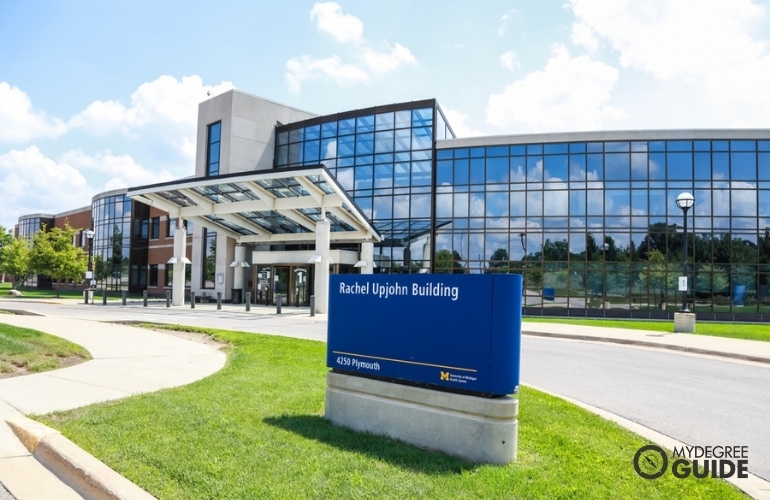Psychology pre med programs are designed for students who want to deepen their knowledge of the human mind while preparing for medical school.

A psychology major pre-med track allows students to study human behavior, cognition, and mental health. This pathway includes the prerequisite courses for medical school, such as biology, English composition, and organic chemistry.
Editorial Listing ShortCode:
Majoring in psychology with a pre med track can be a strategic choice if you’re interested in applying to medical school or pursuing a career in healthcare.
Online Psychology Pre Med Programs

The psychology pre-medicine track combines the study of human psychology with a strong foundation in the sciences.
This approach ensures that students understand how biological, chemical, and psychological processes affect health. You can use this knowledge in medical school to provide compassionate and holistic patient care.
Editorial Listing ShortCode:
Majoring in psychology can also help prepare you to work with patients with behavioral or mental illnesses. Mental health can directly impact a patient’s physical well-being and vice versa. Studying psychology allows you to deepen your knowledge of the mind-body connection and support all aspects of your patients’ health.
As a psychology pre med major, you can expect to study topics like these:
- Chemistry
- Developmental psychology
- English composition
- Genetics
- Health psychology
- Medical terminology
- Neuroscience
- Physiological psychology
- Research methods
- Statistics
Many programs provide opportunities for students to intern and volunteer in healthcare settings. These activities can help you build a competitive application for medical school.
Typically, medical schools require at least 50 hours of clinical service and prefer applicants with extensive community service. Additionally, many psychology pre med programs offer opportunities for students to conduct research.
For instance, you might work for your college’s psychology lab or complete an independent research project under the supervision of a professor. These opportunities let you expand your knowledge of scientific research and teach you how to interpret complex studies. You could use these skills during and after medical school to research diseases and other medical subjects.

Students who earn a psychology degree with a pre medicine concentration can pursue many medical career paths. Many graduates go on to attend medical school and use their knowledge of psychology to specialize in related fields.
For instance, psychiatrists are doctors who specialize in diagnosing and treating mental illness, while neuropsychiatrists treat patients with abnormal cognitive or neurological functioning.
This degree could also lead to a number of medical careers for students who don’t attend medical school, such as:
- Case manager
- Genetic counselor
- Health educator
- Healthcare administrator
- Mental health counselor
- Mental health technician
- Patient advocate
- Rehabilitation specialist
- Substance abuse counselor
These professionals work in many healthcare environments, including community health centers, hospitals, and nursing homes.
Psychology Careers in the Medical Field

Majoring in psychology with a pre med concentration can open the door to many opportunities in healthcare settings. According to the Bureau of Labor Statistics, here are the median salaries of ten medical careers related to psychology.
| Careers | Annual Median Salaries |
| Physicians and Surgeons | $229,300 |
| Medical and Health Services Managers | $104,830 |
| Psychologists | $85,330 |
| Healthcare Social Workers | $60,280 |
| Health Education Specialists | $59,990 |
| Marriage and Family Therapists | $56,570 |
| Substance Abuse, Behavioral Disorder, and Mental Health Counselors | $49,710 |
| Rehabilitation Counselors | $39,990 |
| Social and Human Service Assistants | $38,520 |
| Psychiatric Technicians and Aides | $37,330 |
Some of these careers require additional education and training beyond a bachelor’s degree in psychology with a pre med concentration.
Editorial Listing ShortCode:
Therapists, for instance, must earn a master’s degree and pass a national certification exam. Most psychologists complete a PhD or Doctor of Psychology (PsyD), and prospective physicians enroll in medical school.
Psychology Pre Med Curriculum & Courses

Colleges that offer psychology majors with a pre med track have varying curricula, but they tend to cover similar subjects. Here are a few typical courses:
- Abnormal Psychology: This course teaches you how to diagnose, treat, and prevent mental and behavioral disorders.
- Biology: You’ll expand your knowledge of biological principles and processes, including cell structure, genetics, and evolution.
- Chemistry: This course covers foundational concepts and principles of chemistry, including chemical bonding, states of matter, and thermodynamics.
- English Composition: You can strengthen your critical analysis, presentation, and written communication skills.
- Foundations of Neuroscience: You’ll study how the human brain develops, functions, and influences behavior.
- Health Psychology: You’ll investigate the relationship between mental and physical health and learn how to help patients improve their well-being.
- Psychopharmacology: You’ll explore how psychotropic medications affect brain function, cognition, emotions, and behavior.
- Research Methods in Psychology: This class covers processes and methods for conducting scientific research, from formulating research questions to presenting findings.
- Statistics: You’ll learn about foundational statistical concepts and applications, such as data analytics, descriptive statistics, and predictive modeling.
- Theories of Personality: You’ll explore different theories about how personality develops and the factors that influence it.
Some programs also require students to complete a senior capstone project.
Choosing a Pre Med Psychology Program

Psychology is a popular major for students interested in medical school, so many colleges offer psychology majors with pre med concentrations. You might consider these factors when comparing degree programs:
- Medical school acceptance rates. Colleges often collect data about the number of graduates accepted to medical school. A strong track record of placing students in top medical schools indicates that the program provides a quality education.
- Extracurricular activities. Some colleges have pre-med student organizations, volunteer clubs, and research opportunities that cater to psychology students. These opportunities can help you meet other students who share your goals and may boost your medical school applications.
- Rigor. Medical schools often favor applicants who earn high grades in rigorous classes. You might look for pre med psychology programs with challenging courses.
You can also contact current students and alumni to learn about their experiences in the pre med tracks.
Psychology Pre-Med Course Requirements

Medical schools only accept students who have completed specific prerequisite courses. These classes often overlap with psychology curricula, making this degree a practical choice for aspiring medical students.
Prerequisite med school courses cover English, the natural sciences, and mathematics. These classes ensure that applicants have received a well-rounded education and have developed a wide range of skills.
Psychology majors with a pre med track typically include these prerequisite courses:
- Biochemistry
- Biology
- Calculus
- Chemistry
- English composition
- Physics
- Statistics
You’re required to complete laboratory components for all prerequisite science courses. These labs allow you to gain hands-on experience and learn how to conduct experiments.
Additionally, many psychology programs include advanced science courses that are recommended but not required by medical schools. The recommended courses include genetics, human anatomy and physiology, psychology, and sociology.
Psychology Pre Med Track Programs Accreditation

Regional accreditation is a key factor to consider when comparing psychology programs with a pre med track. Colleges must undergo a rigorous evaluation to receive regional accreditation. Schools that have earned this recognition have demonstrated that they provide a quality education and offer student resources.
Medical schools only consider applicants who have received degrees from accredited programs. Many employers also prefer to hire graduates from accredited schools because they know these students have developed critical skills. In addition, certain financial aid programs only assist students who are enrolled at accredited colleges.
What Can You Do with a Psychology Pre Med Major?
A psychology pre med major teaches students many transferable skills, including communication and critical thinking. You can apply these skills in a broad range of careers. Many graduates enroll in medical school and pursue careers as doctors.
Some students specialize in areas related to psychology, such as behavioral neuroscience and health psychology. This major also prepares students for entry-level careers in the medical field. For example, some graduates become case workers, health educators, and patient care providers. These positions don’t require a medical degree but still allow graduates to work closely with patients.
Is Psychology a Good Pre Med Major?

Yes, psychology is a good pre med major for many undergraduate students. This degree allows you to complete required and recommended prerequisite courses for medical school.
For example, you can take biology with a laboratory component, genetics, and physics. These courses help you develop foundational knowledge that you can build on in medical school. A psychology major also provides insights into mental health and the human mind. As a doctor, you can use this knowledge to support patients’ psychological well-being and help them develop healthy habits.
In particular, some psychology majors attend medical school with the intent to become psychiatrists. The Bureau of Labor Statistics projects that healthcare occupations will grow much faster than average over the next ten years.
Getting Your Psychology Pre Med Degree Online

So, is psychology a good major for med school? Majoring in psychology with a pre med concentration enables you to take prerequisite courses for medical school as part of your undergraduate degree. This pathway streamlines your preparation for med school.
A psychology degree also allows you to gain knowledge and skills you can draw on throughout your medical career. Mental and physical health are intertwined, so treating patients’ physical health often requires you to treat their minds.
If a psychology major sounds like a good fit, you can start your educational journey by exploring accredited schools that offer programs with a pre med track today.

